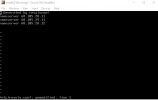#pkg update -f
Updating FreeBSD repository catalogue...
pkg: http://pkg.freebsd.org/FreeBSD:12:i386/latest/meta.txz: Non-recoverable resolver failure
repository FreeBSD has no meta file, using default settings
pkg: http://pkg.freebsd.org/FreeBSD:12:i386/latest/packagesite.txz: Non-recoverable resolver failure
Unable to update repository FreeBSD
Error updating repositories!
What happened?
Updating FreeBSD repository catalogue...
pkg: http://pkg.freebsd.org/FreeBSD:12:i386/latest/meta.txz: Non-recoverable resolver failure
repository FreeBSD has no meta file, using default settings
pkg: http://pkg.freebsd.org/FreeBSD:12:i386/latest/packagesite.txz: Non-recoverable resolver failure
Unable to update repository FreeBSD
Error updating repositories!
What happened?

